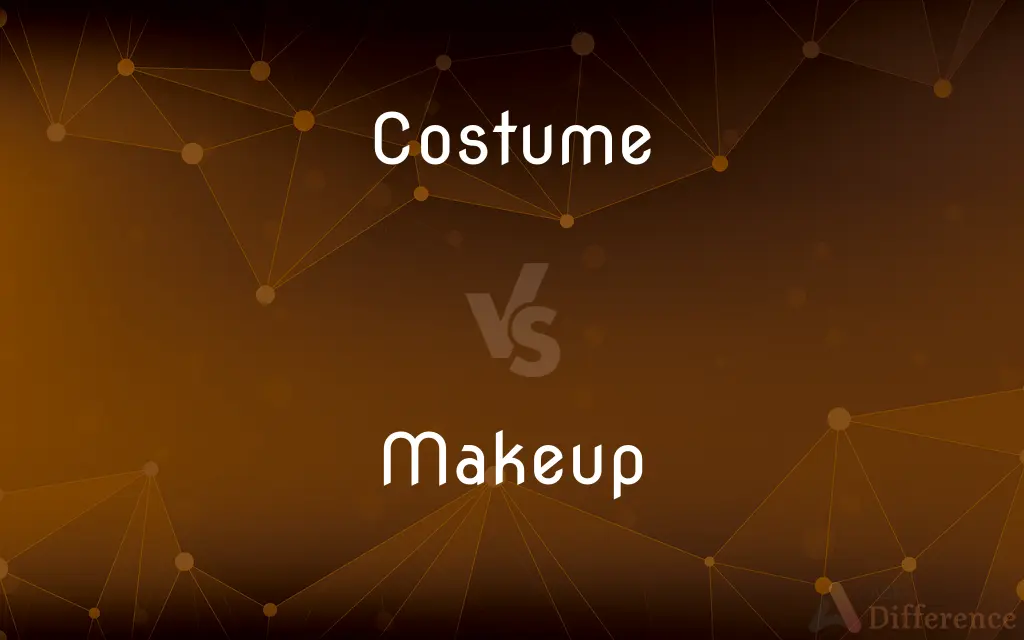Costume vs. Makeup — What's the Difference?
Edited by Tayyaba Rehman — By Urooj Arif — Updated on February 29, 2024
Costume refers to the ensemble of clothing worn to portray a character or period, while makeup involves cosmetics applied to the face to enhance or alter appearance, often used in conjunction with costumes for full character portrayal.

Difference Between Costume and Makeup
Table of Contents
ADVERTISEMENT
Key Differences
Costumes and makeup are both essential elements in the world of performance, fashion, and entertainment, serving to transform individuals into characters or enhance their appearance. Makeup, on the other hand, focuses on the application of cosmetic products to the face, and sometimes the body, to alter or enhance physical features. It can range from simple beauty enhancements to elaborate designs that completely transform an individual's appearance.
Costumes involve the selection and combination of clothing, accessories, and props to reflect a specific character, era, or concept. They are critical in visual storytelling, setting the scene, and conveying a character's social status, profession, or personality. Makeup is used to express emotions, signify character traits, or bring fantastical creatures to life on stage and screen.
Costumes provide a visual representation of a character's role, environment, and period, makeup adds depth and detail to the character's physical appearance. Together, they work synergistically to fully realize a character's portrayal, with costumes offering the broader strokes of identity and makeup providing the nuances and subtleties of the character's visage.
Costumes and makeup have evolved significantly, reflecting changes in fashion, cultural norms, and technological advancements. Historical accuracy in costumes helps anchor a story in its correct time period, while makeup techniques have progressed from basic color application to sophisticated prosthetics and digital effects.
The choice between focusing on costume or makeup depends on the desired impact and the medium of expression. In theatre, costumes might take precedence due to the distance from the audience, whereas in film and photography, makeup's detailed work is crucial for close-up shots.
ADVERTISEMENT
Comparison Chart
Definition
Ensemble of clothing and accessories for character portrayal.
Cosmetics applied to face/body to enhance or alter appearance.
Primary Use
Convey character's era, status, and personality through attire.
Enhance or change physical features for character depth.
Components
Clothing, accessories, props.
Cosmetic products like foundation, eyeshadow, prosthetics.
Application Area
Body-wide, external.
Primarily face, sometimes body.
Skills Required
Designing, tailoring, historical research.
Cosmetic application, artistic design, facial anatomy understanding.
Compare with Definitions
Costume
Furnish with costumes; as for a film or play
Makeup
The way in which something is composed or arranged; composition or construction.
Costume
A set of clothes worn by an actor for portraying a character;
The pirate costume included a hat, sword, and boots.
Makeup
Professional makeup for stage performers to emphasize expressions.
The theater makeup dramatically accentuated the actors' facial expressions.
Costume
A style of dress, including garments, accessories, and hairstyle, especially as characteristic of a particular country, period, or people.
Makeup
Body makeup used for art or fashion shows to create illusions.
The body makeup transformed her into a living canvas.
Costume
Specialized attire for performers in circuses or other entertainment;
The clown's costume was brightly colored with oversized shoes.
Makeup
Cosmetics applied to enhance or alter facial features.
Her makeup for the evening included smoky eyes and red lipstick.
Costume
Traditional attire for specific national or cultural events;
She wore a kimono as her costume for the cultural festival.
Makeup
Special effects makeup used in movies to create characters.
The monster's look was achieved with prosthetic makeup.
Costume
Outfits used in professional settings to denote role or job;
The hospital staff's costume consists of scrubs and comfortable shoes.
Makeup
Daily routine cosmetic application for personal grooming.
His morning makeup routine is minimal, focusing on skin tone.
Costume
A set of clothes appropriate for a particular occasion or season.
Makeup
(Printing) The arrangement or composition, as of type or illustrations, on a page or in a book.
Costume
To put a costume on; dress.
Makeup
The constituent parts of anything; as, the makeup of the new congress was predominantly conservative.
Costume
Costume is the distinctive style of dress or cosmetic of an individual or group that reflects class, gender, profession, ethnicity, nationality, activity or epoch. In short costume is a cultural visual of the people.
Makeup
Cosmetics applied to the face, such as lipstick, facial power, or eye shadow.
Costume
The prevalent fashion of dress (including accessories and hair style as well as garments)
Makeup
The art or process of arranging the portions of a printed publication on the pages for esthetic reasons or for optimal effect on the reader.
Costume
An outfit or a disguise worn as fancy dress etc.
We wore gorilla costumes to the party.
Costume
Clothing designed to imitate a particular period or style for events;
His 1920s costume for the themed party included a fedora and suspenders.
Costume
An outfit or a disguise worn on Mardi Gras, Halloween, or similar occasions.
Costume
To design or furnish costumes for.
Costume
A style of dress, including garments, accessories and hairstyle, especially as characteristic of a particular country, period or people.
Costume
Dress in a costume;
We dressed up for Halloween as pumpkins
Common Curiosities
Can costumes be worn without makeup?
Yes, costumes can be worn without makeup, especially when the focus is on the clothing or in casual contexts.
Is makeup necessary for all theatrical performances?
While not always necessary, makeup is often used in theatrical performances to highlight features and express emotions.
How do costumes contribute to storytelling?
Costumes contribute to storytelling by visually conveying a character's era, social status, and personality.
What role does color play in costumes and makeup?
Color plays a crucial role in both, indicating mood, character traits, and thematic elements.
Can everyday clothing be considered a costume?
Everyday clothing typically isn't considered a costume unless it's used to portray a character or for a themed event.
Can makeup be considered an art form?
Yes, makeup is widely considered an art form, requiring skill and creativity to transform appearances.
Do makeup trends influence theatrical makeup?
Yes, contemporary makeup trends can influence theatrical makeup styles, though the latter often requires more exaggeration.
What's the significance of historical accuracy in costumes?
Historical accuracy in costumes helps to convincingly set the scene and respect the period being depicted.
What's the difference between stage makeup and everyday makeup?
Stage makeup is usually more exaggerated to be visible from a distance, while everyday makeup is subtler.
Are costumes limited to certain materials?
No, costumes can be made from a wide range of materials, chosen for their suitability to the character or era being portrayed.
Can the same costume and makeup be used in different performances?
While possible, costumes and makeup are often tailored to fit the unique requirements of each performance.
How do makeup artists simulate injuries or aging?
Makeup artists use techniques like contouring, shading, and prosthetics to simulate injuries or aging.
How has the use of makeup evolved in film?
Makeup in film has evolved from basic applications to complex techniques involving CGI and prosthetics for realism.
How do costume designers and makeup artists collaborate?
They collaborate closely to ensure a cohesive and accurate representation of characters, considering both visual and narrative elements.
Is there a difference in costume preparation for film vs. theater?
Yes, film costumes may require more detail due to close-up shots, while theater costumes need to be visible from a distance.
Share Your Discovery

Previous Comparison
Fact vs. Fiction
Next Comparison
Theology vs. DivinityAuthor Spotlight
Written by
Urooj ArifUrooj is a skilled content writer at Ask Difference, known for her exceptional ability to simplify complex topics into engaging and informative content. With a passion for research and a flair for clear, concise writing, she consistently delivers articles that resonate with our diverse audience.
Edited by
Tayyaba RehmanTayyaba Rehman is a distinguished writer, currently serving as a primary contributor to askdifference.com. As a researcher in semantics and etymology, Tayyaba's passion for the complexity of languages and their distinctions has found a perfect home on the platform. Tayyaba delves into the intricacies of language, distinguishing between commonly confused words and phrases, thereby providing clarity for readers worldwide.














































